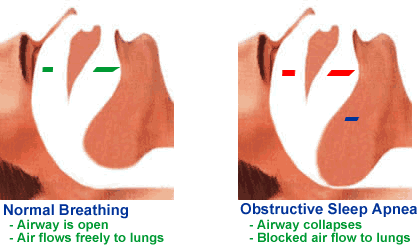Sleep apnea is a common but potentially dangerous sleep disorder that can be characterized by repeated pauses in your breathing while asleep. These pauses can last from a few seconds to minutes and occur thirty or more times per hour. Apneic events usually stop with a loud snort, snore, or choking sound, which can often momentarily wake you up, which will then cause regular breathing to resume.
These pauses can last from a few seconds to minutes and occur thirty or more times per hour. Apneic events usually stop with a loud snort, snore, or choking sound, which can often momentarily wake you up, which will then cause regular breathing to resume.
 Sleep apnea occurs in three main types:
Sleep apnea occurs in three main types:
Obstructive Sleep Apnea: Occurs when throat muscles relax and your airway narrows.
Central Sleep Apnea: Occurs when your body fails to send signals to your muscles that control your breathing.
Complex Sleep Apnea: This combination of obstructive and central sleep apnea.
Obstructive is the most common, accounting for 84% of sleep apnea cases. Complex accounts for 15%, and central accounts for a slight 0.4% of all cases
Causes Of Sleep Apnea
The causes of sleep apnea vary wildly depending on what type of sleep apnea you suffer from.
Obstructive sleep apnea is caused when your airways become narrowed or blocked. This occurs because during sleep, the muscles at the back of your throat relax, causing the soft tissue to obstruct or block your airways. Once the obstruction has occurred, your oxygen levels are lowered, and your brain senses this inability to breathe; your body is then awoken briefly so that normal breathing can resume. In most cases, you won’t even notice you’ve woken up multiple times during the night due to an obstruction, as you are only awake for a few seconds. These sleep disruptions can happen hundreds of times per night and make it impossible for your body to reach the restful stages of sleep. Click here for more information on the causes of obstructive sleep apnea.
Central sleep apnea is caused when your brain fails to send signals to the muscles that regulate your breathing. This causes you to awaken with shortness of breath, and you may find it hard to get back to sleep because you are usually awake for more extended periods. When you suffer from central sleep apnea, you are more likely to remember these sleep interruptions. Click here for more information on the causes of central sleep apnea.
A combination of central and obstructive sleep apnea causes complex sleep apnea. This means that your airways can often become blocked or narrowed, and your brain can also fail to signal your breathing muscles. Click here for more information on the causes of complex sleep apnea.
